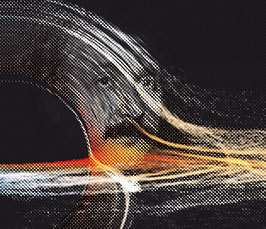A Century of Einstein’s Relativity
Events in Berlin
- Date: Nov 25, 2015
- Time: 06:00 PM - 08:00 PM (Local Time Germany)
- Speaker: Prof. Dr. Kip S. Thorne
- California Institute of Technology, Pasadena
- Location: Henry-Ford-Bau, Garystr. 35, 14195 Berlin
- Host: Max Planck Society & Freie Universität Berlin
- Contact: mpgberlin@gv.mpg.de

100 years ago, Albert Einstein formulated his general theory of relativity – a set of physical laws that attribute gravity to the warping of time and space. These laws have been wonderfully successful. They have been tested with high precision in the solar system and in binary pulsars. They explain the expansion of the universe and predict black holes and gravitational waves. When combined with quantum theory they provide a tentative framework for understanding the universe’s big-bang birth. And they have become embedded in popular culture via, for example, the science fiction movie Interstellar. Thorne will discuss relativity’s first century, using Interstellar to illustrate many of relativity’s profound ideas.
Kip Thorne received his B.S. from the California Institute of Technology (Caltech) in 1962, and his Ph.D. from Princeton University in 1965. He returned to Caltech as an associate professor in 1967 and became a professor of theoretical physics in 1970, the William R. Kenan, Jr. Professor in 1981, and the Feynman Professor of Theoretical Physics in 1991. Thorne’s research has focused on gravitation physics and astrophysics, with emphasis on relativistic stars, black holes and gravitational waves.
In June 2009 Thorne resigned his Feynman Professorship (becoming the Feynman Professor of Theoretical Physics, Emeritus) to launch a new career in writing, movies, and continued scientific research. His first film project was Interstellar (2014), which he worked on with Christopher Nolan. Thorne was the film’s science advisor and an executive producer. Together with Lynda Obst he co-authored the film treatment on which the movie was based.
Music/ Johann Sebastian Bach, Partita no. 2 in D minor BWV 1004 for solo violin (Allemanda - Corrente)
Welcome/ Prof. Dr. Peter-André Alt, President of Freie Universität Berlin
Introduction/ Prof. Dr. Jürgen Renn, Director at the Max Planck Institute for the History of Science
Lecture/ Prof. Dr. Kip S. Thorne, California Institute of Technology, Pasadena
Music/ Wolfgang Amadeus Mozart, Sonata in A major for Piano and Violin K. 305
The selection of musical works harks back to Einstein’s admiration for Bach and his fondness for Mozart’s violin sonatas.
Pianist Sevimbike Elibay studied at the Julliard School in New York and is the recipient of numerous music prizes, i.e. in contests in New York (East and West Artists) and in Enna, Italy (F.P.Neglia). She has made a name for herself as both chamber musician and soloist. Violinist Bernhard Hartog was 1st concertmaster of the Deutsches Symphonie-Orchester Berlin from 1980 to 2014. He also enjoyed great success as a soloist and with the Hartog-Quartett.